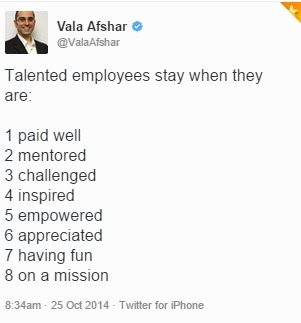A recent feature in Tom Taylor’s “NOW” column highlighted employee reviews of broadcast radio companies. Perhaps you’ve heard of GlassDoor.com – a website that allows workers to rate, compliment, or vent about their companies.
 Yes, many broadcast companies are included in these ratings, along with thousands and thousands of companies and corporations in media, entertainment, and technology. This is important because in the same way that you scope out cars, restaurants, hotels, and other businesses you interact with, it’s now common to check out companies where you might want to work.
Yes, many broadcast companies are included in these ratings, along with thousands and thousands of companies and corporations in media, entertainment, and technology. This is important because in the same way that you scope out cars, restaurants, hotels, and other businesses you interact with, it’s now common to check out companies where you might want to work.
This becomes an even more paramount issue to Millennials who are considerably more likely to do their web-based homework before sending in a resume or seeking out a job opening. Coleman Insights’ Warren Kurtzman recently wrote a great post, “One Hundred Ivy League Millennials Ready For Hire” that rightfully urges broadcasters to integrate motivated college students in station staffs. Here’s his money paragraph:
“It’s time for radio to get past the idea that it can’t attract a new generation of broadcasters. They are out there in high schools and universities everywhere. Let’s invite them into our stations as interns. Give them overnight shifts or—if they’re not ready—shifts on HD and streaming side channels. Have them represent our stations at concerts and community events. Get their feedback in weekly music meetings. Listen to their ideas on how to create content that their generation finds compelling.”
Along, the way, there have been other initiatives that have attempted to address this notion of attracting Millennials to radio, including Edison and RAIN News’ “30 Under 30” – another great way to showcase some of the best and brightest young people already working in radio broadcasting, with the hope of stimulating more hiring and training of younger people.
This has been a common theme on this blog for years. Late last month, we wrote “Movin’ On,” about the tendency of Millennials to change jobs – just like many radio people traditionally have.
And a great idea was flotated in “The $75 Solution” nearly three years ago – a proposal that originally came from “Humble Howard” Glassman, a Canadian radio personality. The concept was for stations across the country to set aside $75 a week to give an up-and-comer a chance to do a live overnight or weekend shift.
We even put together an ad hoc group of interested broadcasters – Don Anthony, Dick Kernen, the guys from RAMP, and yes, Warren Kurtzman among others – to fan out and try to make this happen across the industry. In the end, we couldn’t get enough consensus or buy-in from broadcasters and the idea fizzled out.
As Warren pointed out in his recent article, “Quite simply, I concluded that too many radio companies are not even trying to make our industry attractive to young people.”
It’s hard to argue that point.
 And so that brings us back to this issue of how broadcasters perform on employee evaluation sites like GlassDoor.com. Millennials are checking us out as much as we are checking on them – on social media, reference checks, and other sources.
And so that brings us back to this issue of how broadcasters perform on employee evaluation sites like GlassDoor.com. Millennials are checking us out as much as we are checking on them – on social media, reference checks, and other sources.
I follow Vala Afshar on Twitter who often posts helpful ideas for managers and companies. Vala is the chief marketing officer for Extreme Networks, and is also the author of The Pursuit of Social Business Excellence.
In this recent tweet, he lists the attributes that greatly contribute to retaining employees. And I think these same qualities are exactly what prospective new hires are seeking when they’re test driving companies – or radio stations.
This is a smart checklist for managers to hold up to their own organizations because not only should we be trying to keep our best employees happy, but also create the kind of environment where bright young people want to spend time.
Back when there was an abundance of quality people who were just dying to break into radio, broadcasters in all-size markets had an easy time finding bright, motivated, young radio wannabes to choose from.
Like so many other things in 2014, we’re dealing with a different paradigm in radio, and the scarcity of great people is something that just about every broadcaster can agree on.
Looks like Warren Kurtzman just found a whole bunch of great prospects. So the questions are these:
- Are we going to come to terms with the reality that we’re a legacy industry in need of an influx of new generations of broadcasters?
- Are we going to make it a priority as an industry and as companies to recruit, attract, and train them?
- Are we going to create the type of working environment in which they truly want to work and grow?
Let’s work on that.
- Media And Technology In 2025: Believe It Or Not! - April 18, 2025
- In Radio, You Just Never Know - April 17, 2025
- The Secret To Making A Great Podcast (And Great Radio) - April 16, 2025




Great to see Fred in action at last week’s Massachusetts Broadcasters Convention. The weekend before was the east coast Intercollegiate Broadcast conference at Simmons College, Boston. Radio isn’t attracting students because to often, it’s just not welcoming. Many folks calling shots at stations weren’t part of FM’s rebirth in ’67-’69. They never worked pre automation or before cart machines. Many never cued a record, cracked a mike, changed a teletype ribbon, edited a newscast or put together content. Fred Jacobs, Michael Harrison, Warren Kurtzman and insightful, respected boomer broadcasters get it. But, we’re trying to educate millenials who never caught the passion, spirit and importance of being wireless, everywhere and free. If we concentrate on content and presentation (aka show biz vs. spreadsheets) we can still turn this around and live happily ever after. Best to all. Vote for Radio! http://www.broadcastideas.com
Clark, great to see you at the MBA “Sound Bites” conference. As broadcasters we have some educating to do, especially when it comes to welcoming the up and coming generation of America’s labor force. As Warren pointed out in his article, it starts with broadcasters recognizing the value of Millennials to the radio industry. And as we’ve learned at jacapps, we owe it to them to instill in them the values and assets of our brands, while we learn new protocols and priorities from them. As always, it’s a two-way street. Thanks for chiming in, Clark.